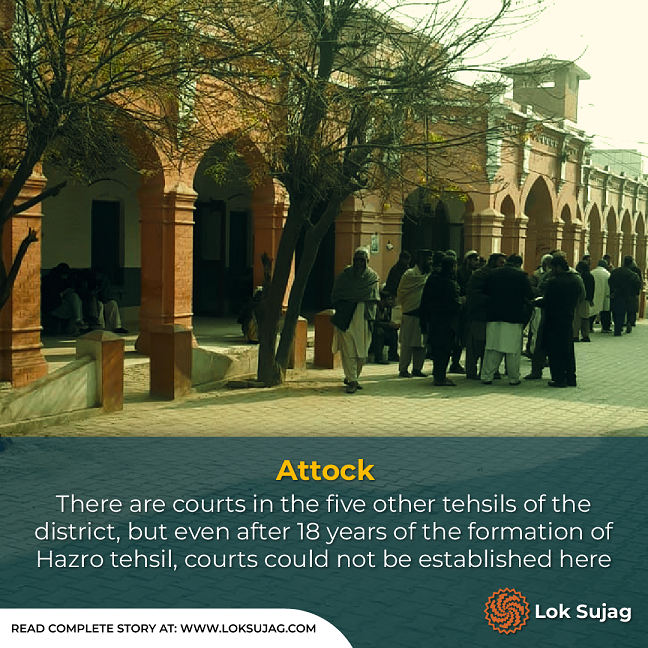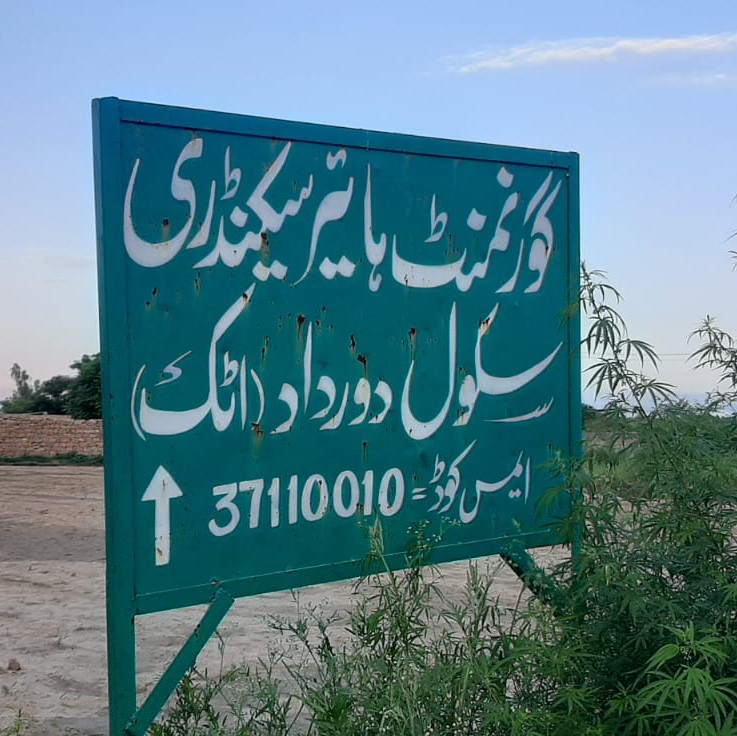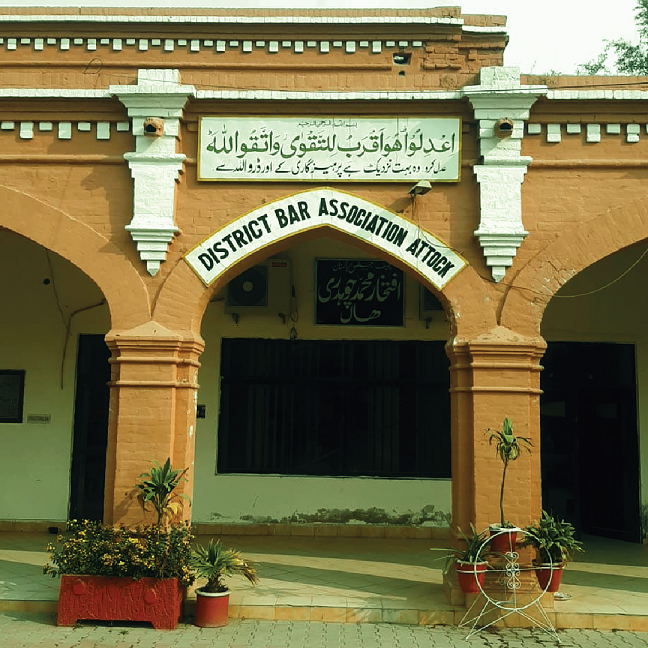The area of Attock district starts at a distance of half an hour to the west of the federal capital. There used to be five tehsils in this district, but in 2005, Hazro was made the sixth tehsil of Attock under public or administrative necessity.
No one has any problem with making Hazro a tehsil, nor is there any problem with it being a part of the Attock district. The suffering of the people here is that even after 18 years, courts could not be established in this tehsil, and residents have to travel to Attock, which is 45 km away, for the most minor civil or criminal cases.
Fifty-year-old Rashida Bibi (pseudonym) is a resident of Hazro. She says that she got separated from her husband years ago. Her father gave her a small house to live in but did not register it in her name, while her brothers wrote all their parents' property in their names.
She says that whatever was left after the death of the parents, her brothers fraudulently transferred it to their names. All the siblings also have a property share in the house where she lives now.
"I just have one son who is chronically sick, and it is difficult to make ends meet. If there was a court in Hazro, I would ask for justice, but I cannot go to Attock. I have heard that court cases take years to wind up and travel costs money. That's why I have left my case to God."

The total population of the district's six tehsils is 21 lakh 70 thousand 423. Except for Attock, the population of four tehsils is less than Hazro. There are courts in five tehsils, including Hasan Abdal tehsil, with a population of a little over two and a half lakh, but around four lakh people from Hazro have been making rounds of Attock for 18 years.
Vadra Khan is a resident of the village Yasin in Hazro. She says that her father died three years ago. To grab the land, her uncle and cousins framed her and her brother Nadeem Khan in a false case of their father's murder when the father had died due to natural causes.
“The court acquitted me, but my brother got a sentence of 25 years. I have to come to the court with my disabled and aged mother to follow the case. We travel 35 kilometres in a rickshaw to Attock. Thousands of rupees are spent on each appearance.”
She says attending one hearing takes up a whole day as she travels to and from Attock. She has to visit Attock to consult with her lawyer and meet her brother. If there were courts in Hazro, she would not have had to face so much trouble.
Mubaras Khan, a resident of Hazro, has been an advocate for 30 years. He comes to Attock court daily, returns in the evening, and sits in his Hazro office. He says this is the only tehsil of Punjab with no courts, and more or less 104 small towns and villages are deprived of this facility.

He claims that the total number of cases filed in Attock courts is more from Hazro than from Attock. Similarly, the annual revenue collected from this tehsil is more than that of other tehsils of the district, but there are still no courts in Hazro.
“I have been trying for tehsil courts for 18 years. For which wall chalking was done throughout the tehsil, I also sought help from the senior lawyers of Hazro, but unfortunately, no lawyer supported me; rather, they discouraged me."
He says that initially, he applied to the Chief Justice Lahore High Court to establish courts, and Chief Justice Khawaja Sharif summoned him. On which he went for a meeting along with some colleagues.
"Chief Justice, while addressing me, said that some lawyers came from Attock bar and said that if courts are built in Hazro, they will die of hunger, as more than 60 per cent of the cases in the Attock courts are from Hazro tehsil. That day, I realised why my seniors were not supporting me."
Mubaras Khan believes that senior lawyers think that most of the citizens of Hazro who live in Europe and America pay reasonable fees, and their income will decrease if the courts are built in the tehsil.
“But they have no idea how elderly and female petitioners from the remote villages of Hazro come to Attock to pursue their cases. Tired of extra expenses for every appearance, people stop pursuing the case. The state should also think about it.”
He says an FIR was registered against him for raising his voice. But he is steadfast and will continue his struggle.

Farakat Khan does business in Hazro. He says that he had an argument with someone over a transaction. He suffered severe injuries, and the matter reached the police. It has been two years, and the case is still in the Attock court.
“Being stuck at every appearance not only affects the business but also costs thousands of rupees. I often had to take the policemen to the court, so I had to hire a car.”
In Hazro, members of local social organisations, such as the Chhachh Muhafiz Committee and Etihad Group, are also trying their best.
In this regard, the Chairman of the Chhachh Muhafiz Committee, Nasir Khan Jadoon, says that 101 kanals and 15 marlas of government land have been selected for building up courts in Hazro on the instructions of the Lahore High Court, but no further progress is being made. However, his committee will continue to strive for this right of the people.
Jahangir Khanzada, the former MPA here, could not be contacted. However, Malik Ansar, his close associate and Tehsil President of PML-N, claims that establishing courts in Hazro now will be one of the top priorities of his party.
The lawyers of District Bar Attock and Hazro are said to be the biggest obstacle in the establishment of Hazro courts. Due to this, the people of this tehsil now have to use wagons and chingchis to go to the courts.
Also Read

Education crisis in Attock: Lack of intermediate teachers leads to dropouts and challenges for students
President Attock District Bar Malik Fakharzad says that he is not at all opposed to the establishment of courts in Hazro, but the quality of the courts at the district level is not possible at the tehsil level.
Former president of the same bar and member of the Punjab Bar Council, Malik Asrar, is a resident of Tehsil Hazro. But he is “not at all in favour of establishing courts in Hazro.”
Explaining the reasons for this, he says that more courts affect the capabilities of judges and lawyers, and people do not get quality justice.
“If there is a court in Tehsil, two civil and criminal judges will sit. Lawyers get to know their mindset in half a month, which is not good for justice. The number of judges and lawyers in the district is higher, and it benefits the petitioner.”
Abdul Malik, a resident of Dhok Muntah, a remote village in Hazro, has been following his case for 20 years. He says that reaching Attock from his village is no less than punishment. The road is worn out, and transport is non-existent, resulting in him walking for miles and changing many public transport vehicles before getting to the court.
“We are poor people and earn our living by selling milk. We had to pay the lawyer's fee once, for which we sold two goats and paid the fee. But to follow the case, we must sell a goat on every third appearance. If the court was in Hazro, we would not have wasted so much money and time."
Published on 18 Jan 2024



















